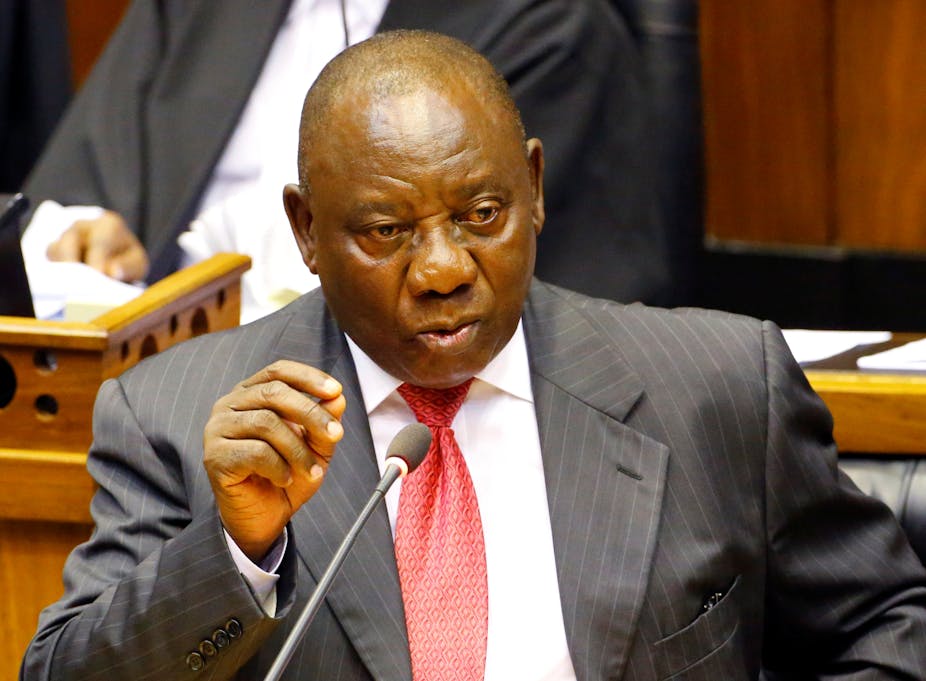The African National Congress (ANC) has made a dangerous habit of bringing post-apartheid South Africa to the brink of instability and the common ruin of all. The resignation of former President Jacob Zuma and his replacement by Cyril Ramaphosa was such a moment. It brought home the point that the over-concentration of power in the office of the president has clearly not worked.
A rethink on president-centred politics and the threats it poses to the democracy are crucial for the post-Zuma period. South Africa needs to re-imagine democratic practice, leadership and how power works.
Some sections of South African society have reduced the Zuma problem to a corruption problem. Dismantle Zuma’s kleptocratic network, the argument goes, and all is solved. Zuma’s demise and a few high profile prosecutions will suffice.
But another view on the Zuma problem – and one with which I concur – suggests it is a problem of contending class projects inside the ANC. The neoliberal class project under Presidents Nelson Mandela and Thabo Mbeki saw South Africa integrated into global markets. It maintained stability through modest redistributive reforms. This project laid the basis for a new black middle class to emerge while systematically weakening labour and the left.
But it surrendered the state (including the presidency) to transnational capital and the power of finance.
The Zuma project, on the other hand, advanced looting as the basis of accumulation and class formation. The extra-constitutional state that emerged deepened the macroeconomic, institutional and legitimacy crisis of the ANC-led state. The left and labour, aligned with the ANC in the tripartite alliance, were co-opted and divided. Both these projects are entrenched in the ANC.
Now what? Messiah-centred presidential politics is extremely dangerous. This is particularly true in a country of extreme inequality and with a formal concentration of power in the office of the president. If politics is not represented, thought and acted beyond this, South Africa is going to repeat historical mistakes.
Since the ANC’s December 2017 conference the media, the banks and international institutions have been talking up a narrative of the “Cyril effect”. Zuma’s removal is attributed to this. In fact the Cyril effect is a narrative of capture of South Africa’s new president by transnational and financial capital.
South Africa’s democracy cannot afford another captured president beholden to credit rating agencies, currency fluctuations, investment flows and business perceptions. South Africa’s democracy has to be grounded in the needs of its citizens and the mandates given by its Constitution.
The ‘Cyril effect’ is hyperbole
The end of Zuma was in fact not because of the Cyril effect. In the main Zuma was removed by the people’s effect which connected the dots of corruption, a mismanaged state and rapacious capitalism.
This resistance was expressed over 15 years through various institutions and social forces. These included:
Battles inside the South African Communist Party (SACP) against Zumafication but which led to expulsions;
By feminists during Zuma’s rape trial and subsequently through #RememberKhwezi;
Artists and cartoonists lampooning Zuma, including with shower heads;
The ongoing struggles in communities against corrupt officials;
The Marikana massacre in 2012. This produced rage among workers and major realignments away from Zuma’s ANC;
The call by trade unions like the metalworkers’ Numsa for Zuma’s removal;
The Vukani-Sidikiwe campaign during the 2014 elections which opened up a national debate on how citizens should vote;
The rise of #ZumaMustGo Campaign. This was in response to the sacking of Nhlanhla Nene as finance minister in December 2015. The NUMSA-led United Front played a crucial role in this;
The #FeesMustFall movement. Students’ demands included labour insourcing as well as quality, decommodified and decolonised higher education;
The 2016 local government elections. These were a harbinger of seismic political realignments against the ANC in key cities;
The role of investigative and nonpartisan media in probing corruption scandals. And the publication of the Gupta-leaks as well as “A Simple Man” and “The President’s Keepers”;
The courageous role from 2010 onwards of then public protector Thuli Mandonsela in drawing attention to ethics and legal violations by Zuma;
Court decisions affirming the judiciary’s independence in relation to Zuma;
Zuma’s miscalculation in firing finance minister Pravin Gordhan, the rallying of activists and the rise of #SaveSouthAfrica. What followed were some of the largest post-apartheid protest marches;
The powerful voice of liberation struggle veterans like Ahmed Kathrada and others who called for Zuma to resign.
The ANC’s legitimacy crisis
As a result of all this activity the crisis of legitimacy in the ANC – and the ANC state – has deepened. This has placed immense pressure on the party to act. In this context, Ramaphosa is playing out his role out of necessity and to secure the ANC’s electoral fortunes.
For middle class and rich South Africans Ramaphosa’s state of the nation speech represented a return to normalcy – a democracy that works for a few. That’s not to say that the new president didn’t make some important announcements in his state of the nation address. This included his comments about state owned enterprises, redistributive state programmes and anti-corruption mechanisms.
Nevertheless, the speech struck chords that resonated with the “return to normalcy” narrative.
But South Africans can’t repeat the mistake made in 1994 when progressive civil society demobilised. The people’s effect has to continue to shape a post-Zuma democracy in the interests of all. The ANC has abused majority support and cannot be trusted with the future of South Africa.
People’s power has to be strengthened and continuously mobilised around strengthening democratic institutions, ending corruption, fundamental economic transformation and advancing systemic alternatives to the climate crisis.

